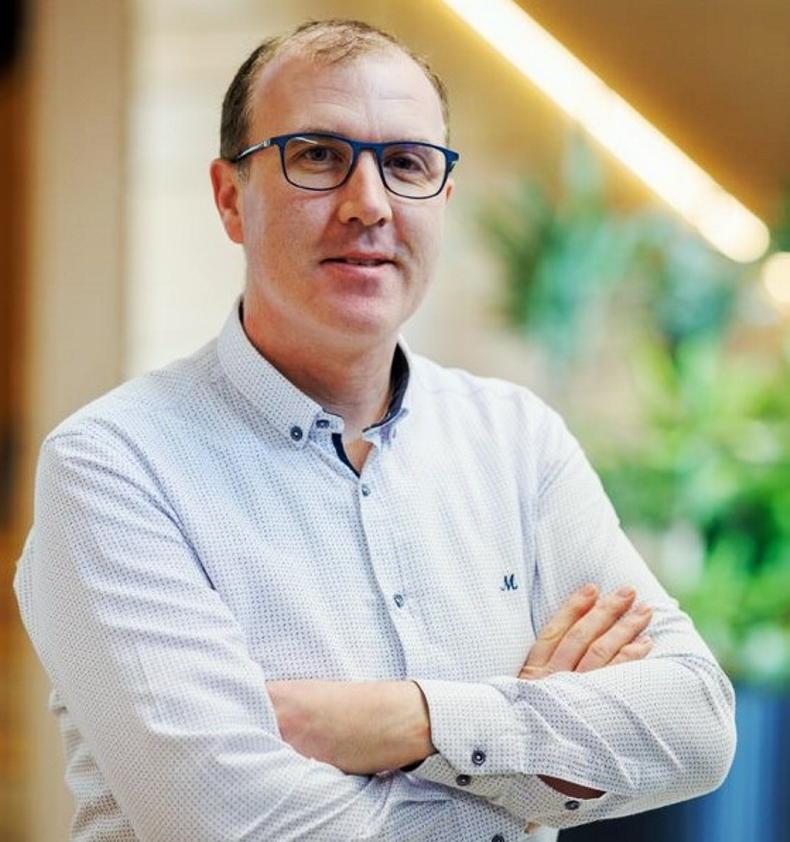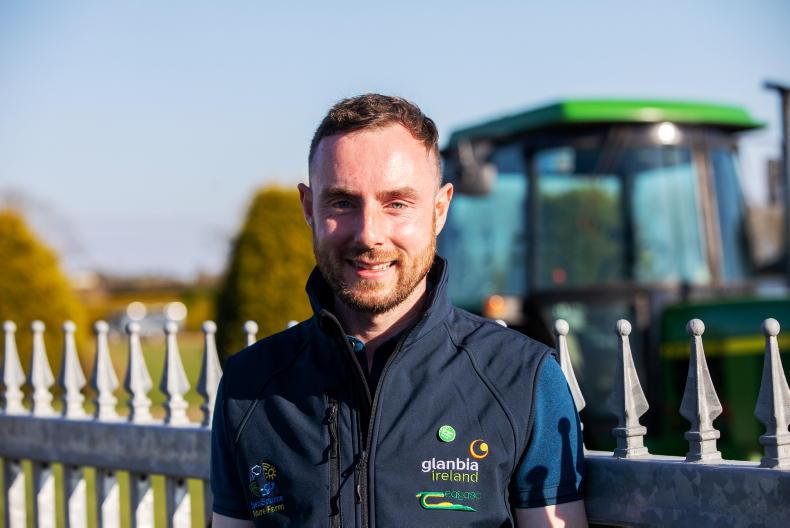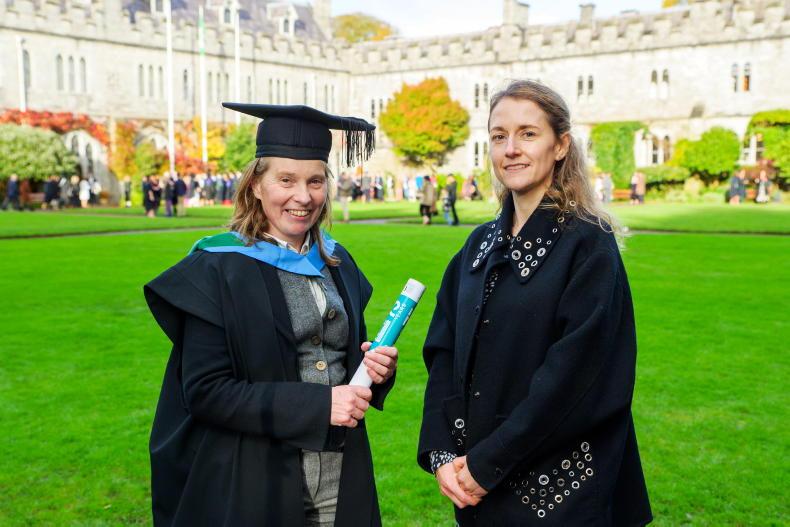Earlier this month, 20 farmers who supply milk to Tirlán completed a new fully-funded Diploma in Environment, Sustainability and Climate through University College Cork (UCC). This was the first group to complete the annual programme, which is delivered on a part-time basis — predominantly online. The farmers obtained a Level 7 award on the Irish National Framework of Qualifications (NFQ).
Flexible learning
The course is tailored for milk suppliers of Tirlán and Baileys Irish Cream and offers farmers a flexible learning experience. It works around the busy periods of spring, giving farmers a two-month break from lectures in February and March during peak calving season.
As part of the Adult Continuous Education (ACE) at UCC, farmers taking part in the course are recognised for their existing knowledge and prior learning. This has resulted in Tirlán Co-op members being granted exemptions from three modules which amounts to 30 credits in total, or 50% of the entire programme.
Thomas Ryan, head of agri sustainability and customer engagement at Tirlán, spoke to Irish Country Living about the benefits of the course, especially in how it facilitates knowledge transfer amongst farmers.

Thomas Ryan, head of agri sustainability and customer engagement at Tirlán.
Building knowledge of sustainability
“We were delighted to be able to partner with a key customer — Baileys — in terms of building sustainability knowledge capacity amongst our farm family suppliers,” he says. “When we approached UCC to develop the course, we went through a process of explaining our dairy farmers’ needs and requirements. We also outlined the actions and activities our farmer suppliers are taking and requirements under cross-compliance derogation,” says Thomas.
This resulted in the reduced modules and credits, as the RPL (Recognition of Prior Learning) process ensures that existing knowledge and experience is recognised and valued.
Entry requirements
As the latest course commenced in September 2023, this year’s applications are now closed. No prior qualifications are needed, but Tirlán Co-op members are asked to complete a detailed personal statement of why they want to take part in the diploma, outlining examples of sustainable practices implemented on their farm.
“This personal statement provides the basis for which suppliers are selected to participate,” says Thomas. “The first group of this programme has just graduated. When they applied to the course, it was four times oversubscribed. This is a positive indication of famers’ willingness to build their knowledge.”
This first group of graduates commenced their studies in September 2022 and graduated on 8 November. Thomas says many graduates are willing to be advocates of the course, encouraging other farmers to do it.
“It is another positive sign of farmers willing to step into and address the sustainability challenges in a credited and educated way.”
For farmers having doubts, he has the following advice: “You are sharing the concerns expressed by so many of the first cohort who graduated this year. Many of those were
apprehensive about putting in an application. When you follow the journey through you see how proud the participants are. For anyone who is interested, I would say go for it.”
Shane Fitzgerald (32), Portlaw, Co Waterford

Farmer Shane Fitzgerald \ Claire Nash
As the Teagasc/FBD student of the year in 2017, Shane developed an interest in the environmental side of agriculture, which made him want to learn more about climate change and sustainability.
“The main reason I wanted to do the course was to inform myself,” he says. “In 2016, I was in Kildalton. At the time, I was more interested in expanding cow numbers and improving production. So I didn’t have as much knowledge on the environmental side of things.
“I can see the way things are changing from a policy perspective. I wanted to be more aware of the bigger picture of what was happening around climate change and how Irish agriculture and farmers fit into that.”
Family farm
Shane believes it is good to be informed on environmental practices so farmers can work to try and improve their sustainability in areas they can control.
“A big draw to the course was it was tailored for dairy farmers,” he says. “I knew we would have the time off during February and March when it was busy during calving.”
Milking 215 cows in a spring-calving, grass-based system, Shane’s family farm is trying to be as self-sufficient as possible.
“The course gave me the bigger picture of what is causing climate change on a global scale. I realised Ireland is a small fish in a very big pond, but I still feel after what I’ve learned, we have to play our part.”
Shane says he now sees the role agriculture must play in reducing emissions in Ireland. Reducing chemical nitrogen, incorporating multi-species swards, digging a pond and moving hedgerows to leave room for nature are some of the measures Shane has implemented on-farm.
“Hopefully, we can show that productive and profitable farming can go hand in hand with leaving room for nature and protecting the environment,” he says.
At the start, Shane’s biggest concern was having enough time to do the course. Being run mostly online was a major advantage.
“You learn a huge amount and it gets you thinking about things outside the farm gate. That knowledge transfer from each other is very important.”
Amanda Mooney, Ashford, Co Wicklow

Wicklow farmer Amanda Mooney pictured with Tirlán’s Senior Key Account Manager Carol Power at the first graduation of the Tirlán and Baileys Sustainable Farming Academy in University College Cork.
After marrying into a family farm 27 years ago, Amanda completed the 180-hour green cert course in Teagasc. Before this, she hadn’t done any other further education.
Having attended the launch of the UCC course, and with a bit of encouragement to apply, she decided it ticked a lot of boxes.
“I am interested in sustainable farming,” she says. “I would like to think that the land we inherited would be there to pass onto somebody else in the future and that it would be in as good condition — if not better — than when we received it. I thought, if I did this course, I might learn something about how to achieve that.”
She says it has been a privilege to go back to education.
“It was a challenge to make the time to attend the lectures and do the assignments each week, but I got a buzz from doing it,” says Amanda.
“It was great meeting like-minded people. I wouldn’t have been a climate sceptic before doing the course, but I wasn’t aware of how critical it is that we change practices now to help the environment.”
The diploma has changed her attitude. Amanda ordered solar panels for the farm before starting the course, for financial reasons. By the time they were installed, she was six months into the course, and starting to feel that the green energy she was producing was more important than any financial savings.
“I would tell anyone to take a chance and go for it — usually, we regret the things we didn’t do, not the things we did do.”
Read more
Agri Careers: first ag Science students graduate from UCC
Education in crisis with teachers shortages in rural schools
Earlier this month, 20 farmers who supply milk to Tirlán completed a new fully-funded Diploma in Environment, Sustainability and Climate through University College Cork (UCC). This was the first group to complete the annual programme, which is delivered on a part-time basis — predominantly online. The farmers obtained a Level 7 award on the Irish National Framework of Qualifications (NFQ).
Flexible learning
The course is tailored for milk suppliers of Tirlán and Baileys Irish Cream and offers farmers a flexible learning experience. It works around the busy periods of spring, giving farmers a two-month break from lectures in February and March during peak calving season.
As part of the Adult Continuous Education (ACE) at UCC, farmers taking part in the course are recognised for their existing knowledge and prior learning. This has resulted in Tirlán Co-op members being granted exemptions from three modules which amounts to 30 credits in total, or 50% of the entire programme.
Thomas Ryan, head of agri sustainability and customer engagement at Tirlán, spoke to Irish Country Living about the benefits of the course, especially in how it facilitates knowledge transfer amongst farmers.

Thomas Ryan, head of agri sustainability and customer engagement at Tirlán.
Building knowledge of sustainability
“We were delighted to be able to partner with a key customer — Baileys — in terms of building sustainability knowledge capacity amongst our farm family suppliers,” he says. “When we approached UCC to develop the course, we went through a process of explaining our dairy farmers’ needs and requirements. We also outlined the actions and activities our farmer suppliers are taking and requirements under cross-compliance derogation,” says Thomas.
This resulted in the reduced modules and credits, as the RPL (Recognition of Prior Learning) process ensures that existing knowledge and experience is recognised and valued.
Entry requirements
As the latest course commenced in September 2023, this year’s applications are now closed. No prior qualifications are needed, but Tirlán Co-op members are asked to complete a detailed personal statement of why they want to take part in the diploma, outlining examples of sustainable practices implemented on their farm.
“This personal statement provides the basis for which suppliers are selected to participate,” says Thomas. “The first group of this programme has just graduated. When they applied to the course, it was four times oversubscribed. This is a positive indication of famers’ willingness to build their knowledge.”
This first group of graduates commenced their studies in September 2022 and graduated on 8 November. Thomas says many graduates are willing to be advocates of the course, encouraging other farmers to do it.
“It is another positive sign of farmers willing to step into and address the sustainability challenges in a credited and educated way.”
For farmers having doubts, he has the following advice: “You are sharing the concerns expressed by so many of the first cohort who graduated this year. Many of those were
apprehensive about putting in an application. When you follow the journey through you see how proud the participants are. For anyone who is interested, I would say go for it.”
Shane Fitzgerald (32), Portlaw, Co Waterford

Farmer Shane Fitzgerald \ Claire Nash
As the Teagasc/FBD student of the year in 2017, Shane developed an interest in the environmental side of agriculture, which made him want to learn more about climate change and sustainability.
“The main reason I wanted to do the course was to inform myself,” he says. “In 2016, I was in Kildalton. At the time, I was more interested in expanding cow numbers and improving production. So I didn’t have as much knowledge on the environmental side of things.
“I can see the way things are changing from a policy perspective. I wanted to be more aware of the bigger picture of what was happening around climate change and how Irish agriculture and farmers fit into that.”
Family farm
Shane believes it is good to be informed on environmental practices so farmers can work to try and improve their sustainability in areas they can control.
“A big draw to the course was it was tailored for dairy farmers,” he says. “I knew we would have the time off during February and March when it was busy during calving.”
Milking 215 cows in a spring-calving, grass-based system, Shane’s family farm is trying to be as self-sufficient as possible.
“The course gave me the bigger picture of what is causing climate change on a global scale. I realised Ireland is a small fish in a very big pond, but I still feel after what I’ve learned, we have to play our part.”
Shane says he now sees the role agriculture must play in reducing emissions in Ireland. Reducing chemical nitrogen, incorporating multi-species swards, digging a pond and moving hedgerows to leave room for nature are some of the measures Shane has implemented on-farm.
“Hopefully, we can show that productive and profitable farming can go hand in hand with leaving room for nature and protecting the environment,” he says.
At the start, Shane’s biggest concern was having enough time to do the course. Being run mostly online was a major advantage.
“You learn a huge amount and it gets you thinking about things outside the farm gate. That knowledge transfer from each other is very important.”
Amanda Mooney, Ashford, Co Wicklow

Wicklow farmer Amanda Mooney pictured with Tirlán’s Senior Key Account Manager Carol Power at the first graduation of the Tirlán and Baileys Sustainable Farming Academy in University College Cork.
After marrying into a family farm 27 years ago, Amanda completed the 180-hour green cert course in Teagasc. Before this, she hadn’t done any other further education.
Having attended the launch of the UCC course, and with a bit of encouragement to apply, she decided it ticked a lot of boxes.
“I am interested in sustainable farming,” she says. “I would like to think that the land we inherited would be there to pass onto somebody else in the future and that it would be in as good condition — if not better — than when we received it. I thought, if I did this course, I might learn something about how to achieve that.”
She says it has been a privilege to go back to education.
“It was a challenge to make the time to attend the lectures and do the assignments each week, but I got a buzz from doing it,” says Amanda.
“It was great meeting like-minded people. I wouldn’t have been a climate sceptic before doing the course, but I wasn’t aware of how critical it is that we change practices now to help the environment.”
The diploma has changed her attitude. Amanda ordered solar panels for the farm before starting the course, for financial reasons. By the time they were installed, she was six months into the course, and starting to feel that the green energy she was producing was more important than any financial savings.
“I would tell anyone to take a chance and go for it — usually, we regret the things we didn’t do, not the things we did do.”
Read more
Agri Careers: first ag Science students graduate from UCC
Education in crisis with teachers shortages in rural schools









 This is a subscriber-only article
This is a subscriber-only article










SHARING OPTIONS: